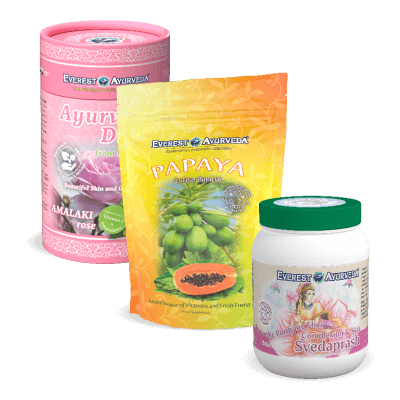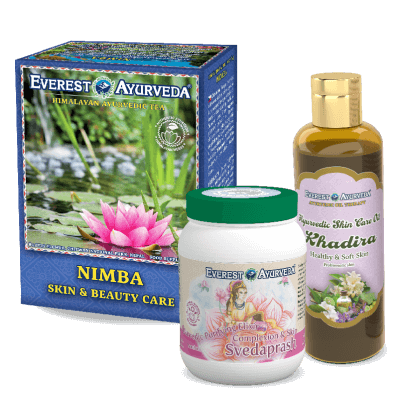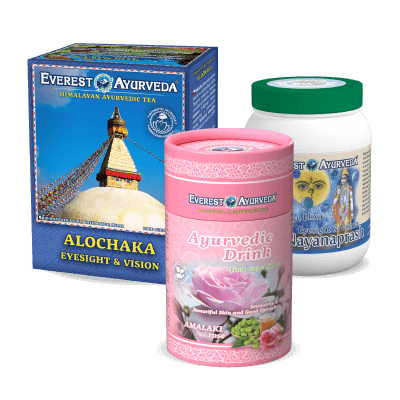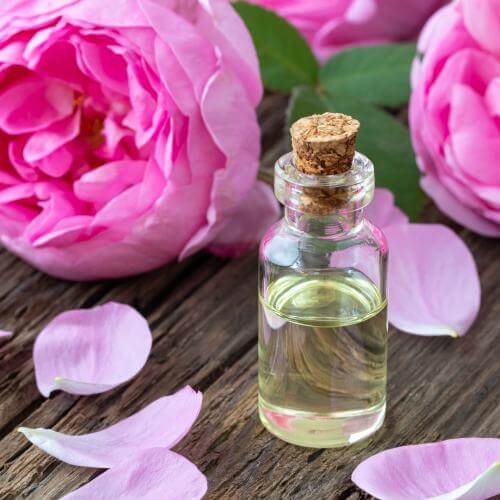
The rose, known in India as Shatapatri or Taruni, has a very wide range of uses in eastern countries. In Persia, India, China and other countries, the tradition of its use is not only connected to the production of perfumes and cosmetics, as is customary in our environment, but is a common part of gastronomy and therapeutic recipes of Ayurvedic medicine.
Rose as Medicine
This ornamental plant possesses numerous medicinal properties that are mentioned in classical Ayurvedic scriptures and confirmed by scientific research. Shatapatri occupies an important place in Ayurveda due to its cooling properties, which have a calming effect on Pitta dosha. By reducing this dosha, it helps bring balance to the body. It is also beneficial for maintaining good heart health, calming the mind, and improving skin condition. It is often included in Ayurvedic preparations designed to detoxify the body and improve the overall sense of well-being. Rose water is traditionally used to improve eyesight quality when applied directly to the eyes.
Scientific studies show that roses contain a variety of bioactive compounds such as flavonoids, tannins, terpenes, and various essential oils. These substances contribute to their anti-inflammatory, antioxidant, and antibacterial effects. Research also suggests that roses have a positive effect on mood and anxiety reduction, supporting their traditional use in aromatherapy. Their pleasant scent is also considered soothing to the mind and emotions in Ayurvedic practice. Rose extracts are commonly used in cosmetics as they soothe, harmonize, and tone the skin. Their antiseptic properties can help treat minor skin irritations.
History and Cultural Significance of the Rose
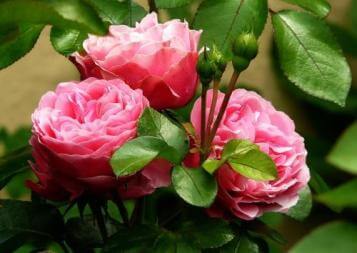 The rose, whose homeland is primarily in Eurasia, now encompasses more than a hundred varieties that have been developed over the centuries through natural intermingling and targeted breeding of several native species. In European regions, these were mainly the Gallic rose (Rosa gallica), the dog rose (Rosa canina), the Persian rose (Rosa persica), and the Damask rose (Rosa damascena) from the Middle East, which is now widely cultivated to produce the famous rose oil in Bulgaria. In China and India, the predominant species were the Chinese rose (Rosa chinensis/Rosa indica) and the giant rose (Rosa gigantea). The cabbage rose (Rosa centifolia), which plays an important role in traditional Indian cuisine and Ayurvedic medicine, was created through crossbreeding of the Damask rose, Gallic rose, and dog rose in Asia Minor and the Caucasus region. In the 16th century, it underwent further cultivation in Europe, where it subsequently became particularly renowned as a key ingredient in French perfumes.
The rose, whose homeland is primarily in Eurasia, now encompasses more than a hundred varieties that have been developed over the centuries through natural intermingling and targeted breeding of several native species. In European regions, these were mainly the Gallic rose (Rosa gallica), the dog rose (Rosa canina), the Persian rose (Rosa persica), and the Damask rose (Rosa damascena) from the Middle East, which is now widely cultivated to produce the famous rose oil in Bulgaria. In China and India, the predominant species were the Chinese rose (Rosa chinensis/Rosa indica) and the giant rose (Rosa gigantea). The cabbage rose (Rosa centifolia), which plays an important role in traditional Indian cuisine and Ayurvedic medicine, was created through crossbreeding of the Damask rose, Gallic rose, and dog rose in Asia Minor and the Caucasus region. In the 16th century, it underwent further cultivation in Europe, where it subsequently became particularly renowned as a key ingredient in French perfumes.
Cabbage Rose
This noble rose species has a rich history and cultural significance throughout the world. In India, it is considered a flower that gained prominence primarily during the Mughal dynasty (1526-1858), rulers who came to India from Central Asia and cultivated roses and other flowers in their magnificent palace gardens. These flowers were then used to produce intoxicating fragrances and perfumes according to Arab-Persian traditions. In India today, the rose is considered a symbol of both earthly and transcendental love and is used in secular celebrations and religious ceremonies known as pujas.
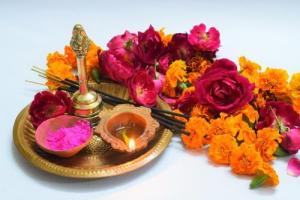

In Persian poetry, the cabbage rose was regarded as a symbol of beauty and served as a metaphor for perfect love. In ancient Egypt, Queen Cleopatra incorporated it into her famous perfumes and baths. In Europe, this rose is associated with Saint Elizabeth of Hungary, patron saint of the sick and poor, who was renowned for her care of the suffering. This rich cultural heritage contributes to the perception of the cabbage rose not only as a beautiful flower, but also as a symbol of love, beauty, and spiritual purity.
Rose and its Properties and Effects According to Ayurveda
Ayurveda attributes different kinds of properties and natural characteristics to each plant. The specific configuration of everything we consume then, according to these characteristics, affects our body by strengthening or weakening the three doshas - vata, pitta and kapha, whose mutual balance at the individual level affects the overall health of a person.
- the basic quality (guna) of the rose is lightness
- the basic taste (rasa) is bitter, astringent and sweet
- the basic potency is cooling
- it is tridoshic, has a beneficial effect on all three doshas
Health Effects of Rose
- strengthens the heart
- absorbs substances in the intestines, helps with IBS (irritable bowel syndrome) and diarrhoea
- improves digestion
- as a cardiac tonic, it cares for heart health
- supports the female and male reproductive system
- promotes good skin and complexion
- harmonises brain activity
- relieves the feeling of internal heat and burning (often with increased pitta) and thus helps with fever, gastritis, sore throat, laryngitis, sunburn, etc.
Traditional Use of Cabbage Rose in Ayurveda
In addition to the crushed petals used as powder, paste, jam, the famous rose water or fragrant rose oil, there is another exceptional way to reap the great health benefits of the rose and that is in the form of a sweet Indian delicacy called gulkand. This dessert is prepared with dried rose petals and cane sugar. The recipe on how to make it easily at home can be found below.
 Rose petal powder - add ¼ to ½ teaspoon of rose powder to milk or water and take on an empty stomach once or twice a day. Helps with acidity.
Rose petal powder - add ¼ to ½ teaspoon of rose powder to milk or water and take on an empty stomach once or twice a day. Helps with acidity.
Rose water from soaked rose petals - add 2-3 teaspoons of rose water to a glass of pure water. Drink it before meals once or twice a day as a stomach tonic. Separately, use it to rinse your eyes to relieve burning or as a facial toner for hydration.
Fresh rose petals - chew 2-4 petals preferably in the morning, helps with mouth aphthae.
Rose sharbat (rose syrup) - mix 2-3 teaspoons of rose sharbat with a glass of water and drink before meals to relieve the feeling of bitterness and burning in the body. It helps to cool and reduce pitta dosha.
Rose tea - clean 5-6 fresh rose petals (per 250 ml of water) and remove the white base (so that the tea is not bitter). Simmer for 5 minutes until the petals darken. Strain the mixture and enjoy a cup of fragrant tea that helps with weight loss.
Gulkand
Gulkand is a sweet preserve made from the petals of pink roses that originates from the Indian subcontinent and is used in both Ayurvedic and traditional Persian medicine for imbalances in the body. The term is derived from the Persian names gul (rose) and qand (sugar/sweet). It is an excellent herbal preparation that:
- reduces the occurrence of ulcers and aphthae in the mouth and helps to relieve burning and pain in the mouth and throat
- helps reduce fatigue, muscle pain, lethargy and stress tension
- Beneficial for acidity, heartburn, indigestion and stomach pain
- helps reduce the side effects of antibiotics, painkillers and other drugs that cause nausea, burning and ulcers
Take 1-2 teaspoons of gulkand 1-2 times a day, ideally with water or milk to help absorb its effects.
How to prepare gulkand easily at home?
Place a layer of rose petals in a glass jar and evenly sprinkle a layer of cane sugar on top. Then spread a layer of flower petals again and a layer of sugar on top. Repeat the process until you have filled the jar and then close the jar with a lid and keep it in the sun for 7 to 10 days. Every other day, stir the gulkand with a clean spoon. Store afterwards in an airtight container and refrigerate.
Benefit from the beneficial effects of rose stool in our authentic Ayurvedic preparations:
AMLA Drink ROSE
This drink promotes immunity, beautiful skin and good eyesight. Rosehip contributes to clear and healthy-looking skin, mental balance and optimizes the state of eyesight. Amalaki supports the function of the digestive system, stomach and intestinal tract. Vitamin C in the drink supports collagen production, energy metabolism, immune system, protects cells from oxidative stress, increases iron absorption and reduces fatigue and exhaustion.
AMLA Fruit Rose
This fruit is a natural source of antioxidants and vitamin C. Rose hip contributes to mental balance, while amalaki supports the function of the digestive system, stomach and intestinal tract and strengthens the immune system.
Ayurvedic Immunity Set Immunity & Skin Beauty
Combine AMLA Drink ROSE to cleanse and revitalize the skin with SVEDAPRASH Ayurvedic Cleansing Elixir to maintain the appearance of the skin and contribute to its purity. This package provides natural sources of vitamins and antioxidants to promote glowing skin with Ayurvedic herbs that purify the blood and boost the body's immunity. It is easy to take and is ideal for those who want to take care of their health and beauty through natural means.

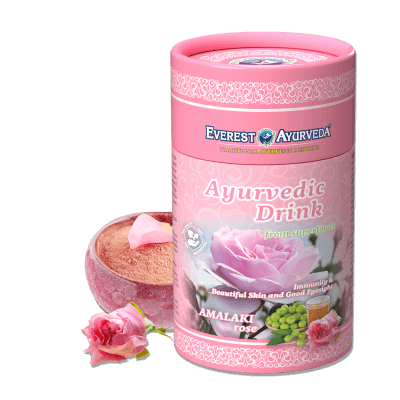 100 g
100 g 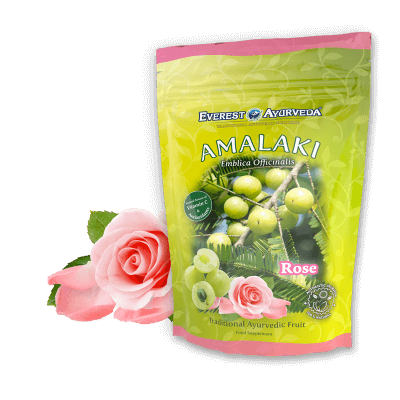 100 g
100 g 